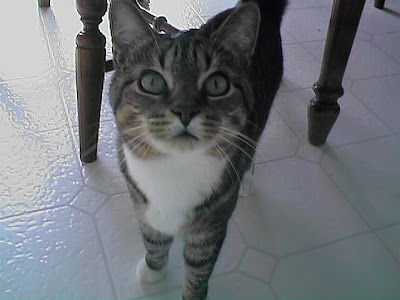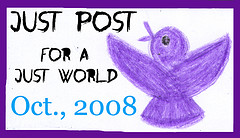“Mommy, I want Manx back.”
“I know, Will. But Manx is gone.”
“But I love her, Mommy.”
“We love her, too, Will.”In 1993, Manx was found with a litter of kittens at a rest stop off I-81 in Pulaski County, Virginia. Upon bringing the group home, the people that found her quickly noticed that Manx was “different.” Because the family had many animals and several big dogs, they realized that Manx’s petite stature and physical differences put her at risk. Paul offered to take her in and upon doing so, renamed her “Manx,” (the folks who found her had called her “Pixiedust”). When Paul brought her to the vet, they estimated her age at “around 2, we think”, confirmed that she had given birth (we don’t know what happened to the kittens), and said that her “special” qualities may have been due to being hit by a car, experiencing a seizure while giving birth, or a developmental disability. Regardless of what caused her differences, it was clear that they did not cause her any distress and that she was otherwise in perfect health.
When I met Manx in 1998, she was a happy, round little furball. We met when she tried to rub against my legs, missed me, and fell. This is how Manx usually introduced herself: walking on the backside of the sofa and falling on your lap, rubbing on your feet and falling over, jumping up to sit beside you only to miss and splat on the floor. The coordination and grace that characterizes most cats were completely lost on Manx. Her back and front ends seemed out of touch with each other; one moving to the right when the other moved left. Her balance was always a bit off; a good sneeze knocked her over. It was all incredible endearing and a constant amusement.
 She wasn’t the sharpest cat. Manx would rub on an open door, rubbing along its base, pushing it so that it would swing out from under her, making her fall over on to the floor. She’d act surprised, get up, and repeat the motions — over and over — until finally the door slammed shut, causing her to startle and hop away. A few minutes later, we’d see her performing the same incantations with another open door.
She wasn’t the sharpest cat. Manx would rub on an open door, rubbing along its base, pushing it so that it would swing out from under her, making her fall over on to the floor. She’d act surprised, get up, and repeat the motions — over and over — until finally the door slammed shut, causing her to startle and hop away. A few minutes later, we’d see her performing the same incantations with another open door.While not the smartest of felines, she was one of the prettiest. Perfect white chest and four precious white paws. Permanently petite in stature (6-7 pounds was her ideal weight), silky soft to touch, and with beautiful brown, tan, and grey stripes that graced her back and tail. Photographs rarely captured the sweetness of her appearance.
Manx lived to love. Anyone, anytime, all the time. (Video link.) Until my asthma became too much, she curled up each night next to my chest. It was a chore to train her to sleep at our feet; some nights we woke up with her trying to squeeze herself on to our pillow. She was happiest rubbing herself against you (or anyone), having her back scratched and head rubbed. Her “elevator butt” — the rising butt that came when you scratched her back — was very impressive. Any contact with her caused her hair to fly off her body en masse, making you think she was going bald, but her coat remained unchanged. The patterns would change over time, but the amount of hair that came off never ceased… bathing and brushing rarely made a difference. In addition to purring, she showed her contentedness by drooling. So after a particularly heavy petting session with Miss Manx, you would not only be covered in hair, but her drool acted as a glue to stick the hair to you. It was not uncommon to get calls from friends who had visited weeks before, saying that they had found Manx hairs (conspicuous due to their striped appearance which mimicked her coat) on their belongings. I once found a Manx hair inside a book I was reading on the Metro in Washington, DC, two weeks after I’d been to see Paul (when we were still dating.)
We laughed over Manx’s antics almost everyday. One spring day in Michigan, I let the cats on the back deck as I worked with the container gardens. Suddenly, Manx was gone! We realized that she had jumped off the deck (almost one story high) and was happily munching grass in the backyard. Paul and I mobilized to get her back into the house, working together to corral her to the front door. Manx was spooked and put up a chase. She ran to the front door as fast as she could — which for Manx, looked like Pepi Le Pew bouncing through the air, with her back end flopping side to side with each bounce. Watching her run from behind put us in hysterics; we giggled as we ran to the front. We had no idea how far she’d go to get back inside. Instead of stopping at the front door, Manx, in a single moment of grace, leaped from the front path over the stoop and sailed through the air toward the door — only to be stopped mid-air by the glass front. It was like watching Wylie Coyote slam into the side of a cliff, pause, and then slowly slide down. Manx did exactly the same thing, coming to a stop in a puddle on the front step. She was fine; but we pulled muscles laughing. (“We’re not laughing at you, sweetie, we’re laughing with you!”)
Manx wanted everyone around her happy. If someone raised a voice, she was there — rubbing against legs, mewing her concern. When Will suffered with gas pains as a baby, Manx cried as much as he did. She sensed our emotions and seemed to try to make us feel better when we needed it.
When Scout came into our lives, Manx took him in like her own baby. She carried him by the scruff, groomed him, and curled up beside him to nap. Scout, fireball that he was, responded by tackling and pouncing on Manx at every opportunity. He’d wait patiently, perched high on a shelf, watching for her to appear. Then jump down, directly in front of her, completely freaking her out. Manx complied with his annoying habits by playing the tattletale; even when Scout didn’t touch her, she’d whine and cry loud enough to cause trouble. Even as cats, the two of them were great at the “I’m not touching you” games that siblings play.
 As Manx suddenly dropped weight, lost some hair, and began to show her age (in the past few months) Scout’s demeanor toward her changed. He began grooming her, allowing her to eat from their food dish first, walking back from the water bowl to allow to her to drink. We understand that he was very protective of her body when she passed.
As Manx suddenly dropped weight, lost some hair, and began to show her age (in the past few months) Scout’s demeanor toward her changed. He began grooming her, allowing her to eat from their food dish first, walking back from the water bowl to allow to her to drink. We understand that he was very protective of her body when she passed.We found out that she was gone while out to dinner with my parents in Mobile. In order for us all to say goodbye, to make it real, we knew we needed to personally handle her final arrangements. On Sunday, we had a small goodbye in the backyard, with the girls next door (who were very fond of her), and buried her by the lantana in our planting bed.
Will and I painted shards of slate (I’ve been collecting discarded slate for painting medium) — I made a memorial plaque and Will painted “Our Family: Daddy, Mommy, Will, Kate, Scout and Manx”. We hung these on the fence around where we buried her. Before putting her in the ground, we held her remains, petted her fur (she felt just the same, as soft and silky as ever), and did what we needed to do to make it real for us. The girls’ being there helped keep it light and pleasant. Will said goodbye, but it still struggling with missing her and understanding what it means. Frankly, the concept of “here” and “gone” is pretty abstract (do I even understand it?) so I think he’s doing quite well, all things considered.
We love you, Manx! Thank you for being our special girl.















Melanie | 06-Mar-07 at 2:42 pm | Permalink
I have big fat tears rolling down my cheeks. Sweet, sweet Manx. She was a wonderful cat.
Laura | 06-Mar-07 at 4:44 pm | Permalink
What a wonderful way to remember her! Manx WAS different – I didn’t have an allergic reaction to her. So she will hold a special place in MY heart, since I didn’t violently sneeze in her presence.
By the way, I love the slate marker.
Holly | 06-Mar-07 at 9:49 pm | Permalink
Thank you both!
Manx was really special, just as all pets are with whom we share our lives with and call our family.
I really liked painting on slate (Paul had been suggesting it for months with all the debris on the streets and just recently had I started foraging.) Will really enjoyed it, too! Just have to watch out for those edges…